Today, Smith College is known as one of the most LGBTQ+ friendly colleges in the United States.1 However, homosexuality was once hotly debated on campus, and before there was Confesh, the Sophian was the go-to platform to exchange discourse on the most pressing issues.
Below, you will find a selection of op-eds and letters to the editor from 1978, in which students from all corners of campus weigh in on the rights of lesbians at Smith.2
The controversy begins
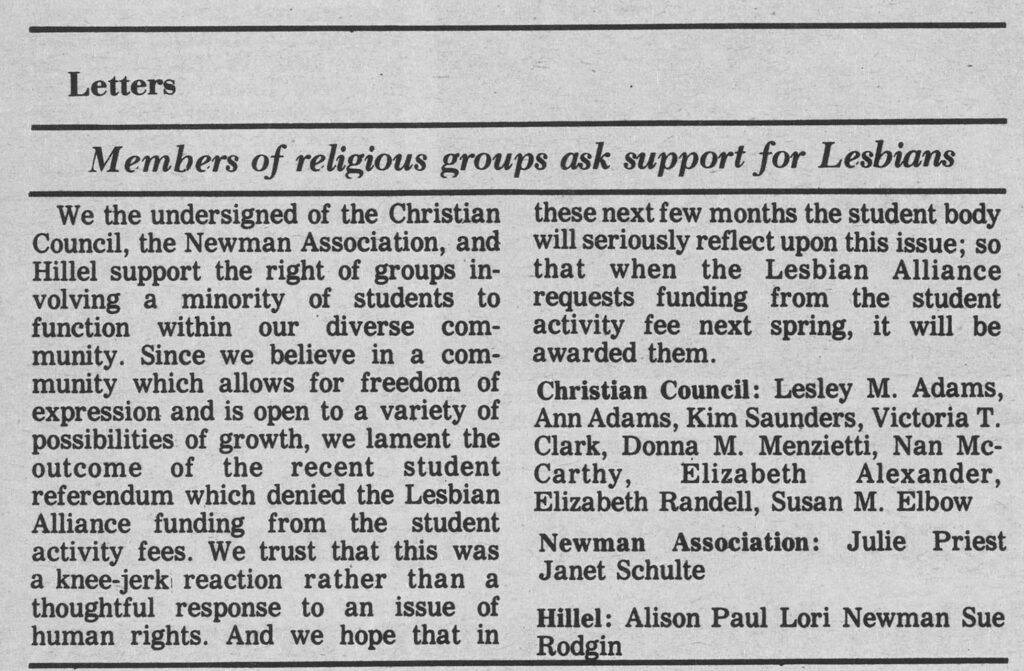
Sophian, Volume 26, Number 13, Page 4, February 9, 1978. Student publications and student publications records, Smith College Archives
The Smith Lesbian Alliance was chartered in the spring of 1977.3 Though this was an indicator of rising lesbian visibility on campus, the group was met with opposition—a majority of the student body voted against providing funding to the Lesbian Alliance from the student activity fee.
That fall, members of the student religious groups the Christian Council approached the Newman Association and Hillel to co-sign a statement of support for the Lesbian Alliance.4 It went to print in the Sophian on February 9, 1978.
It may surprise some audiences that student religious groups were the first outspoken defenders of lesbians in this saga, since modern anti-gay movements are most commonly associated with Christianity. However, this initiative from the Smith Christian Council, an ecumenical Protestant group affiliated with the Helen Hills-Hills Chapel, was in-step with many other mainline Protestant denominations of the time. Other archival records of this era show that the Chapel was even actively collecting resources for “open and affirming” pastoral leadership.5
The following week, the Sophian published an impassioned response from “born-again Christian” student Theresa Dolan, who claimed that “any form of homosexuality is an abomination to God.”
Dolan, as a graduate student in the education department, would not have had any financial stake in the allocation of undergraduate student activity fee. Her letter, therefore, is a personal condemnation of lesbian students and those that support them.
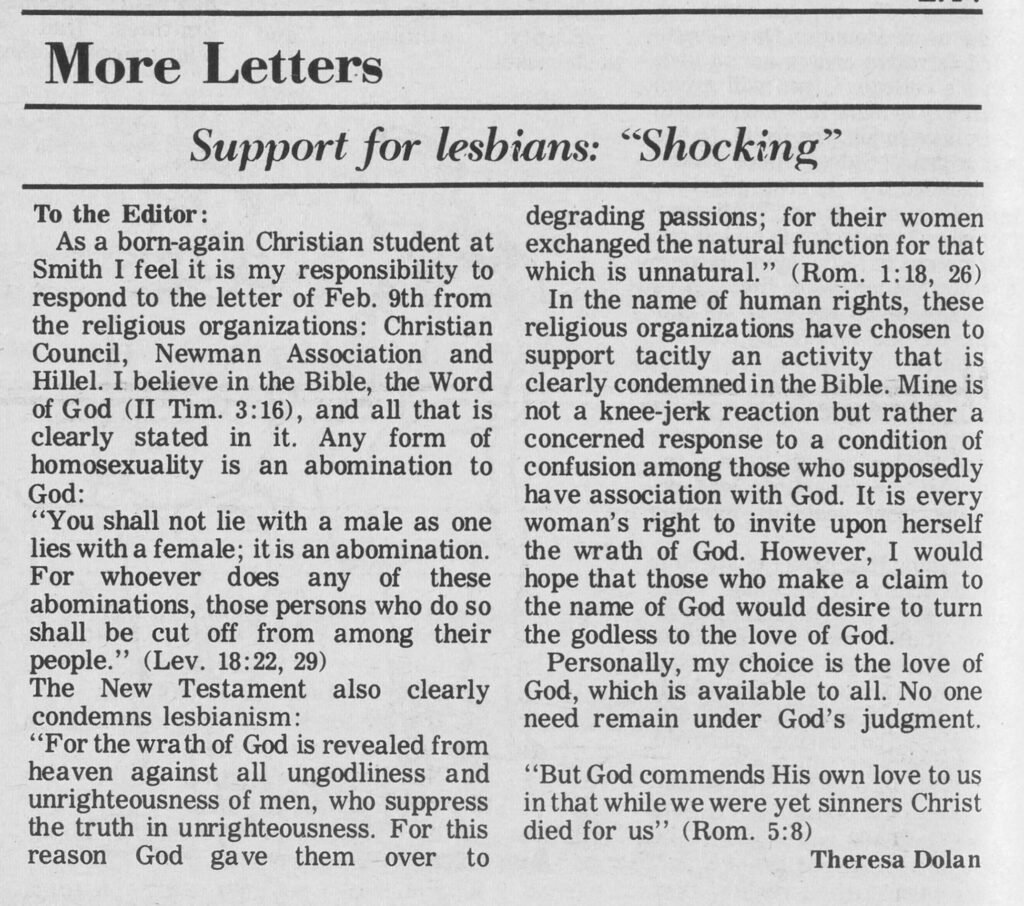
Sophian, Volume 26, Number 14, Page 4, February 16, 1978. Student publications and student publications records, Smith College Archives
Religion majors fire back
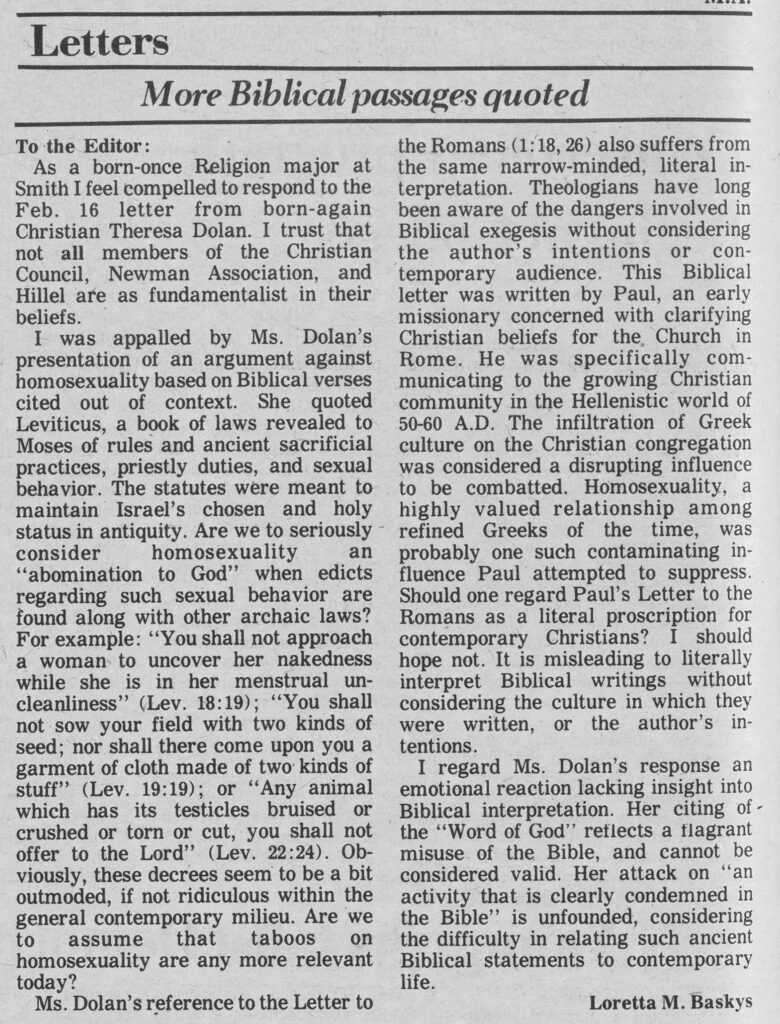
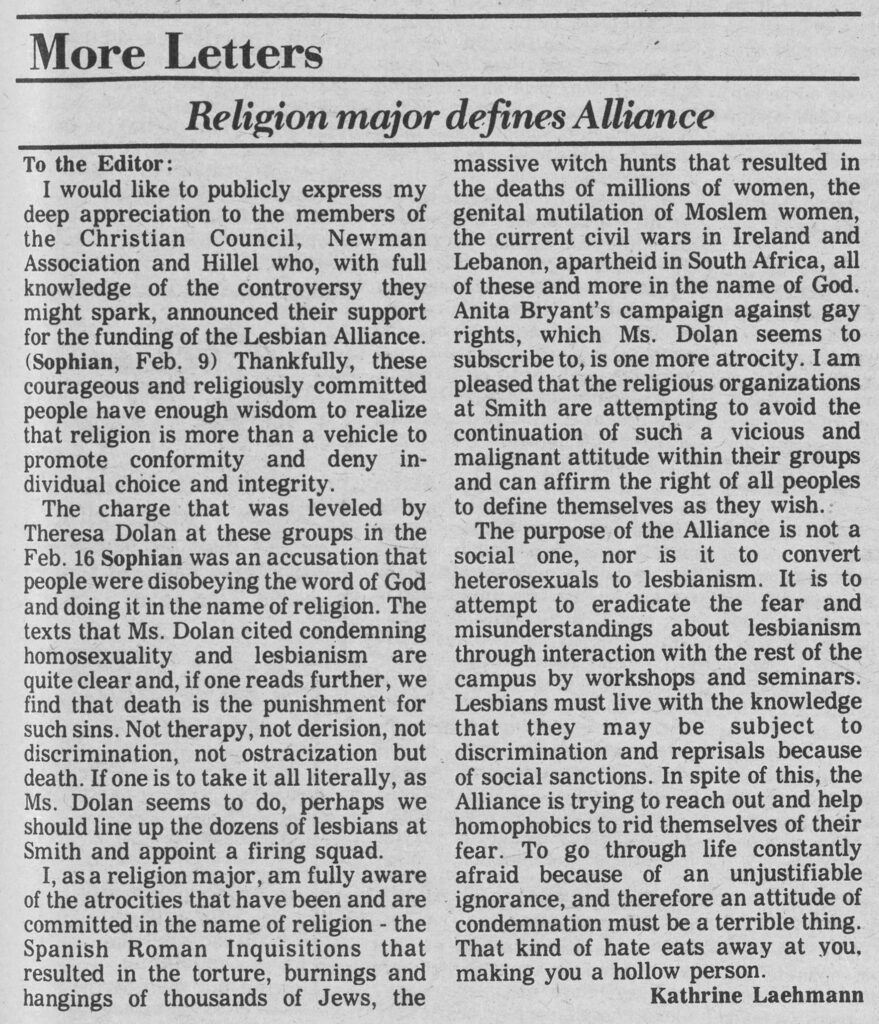
Sophian, Volume 26, Number 15, Pages 4-5, February 23, 1978. Student publications and student publications records, Smith College Archives
Two religious studies students picked apart Dolan’s biblical interpretations, criticizing them as literalist and out of context. Lehmann went even further to call anti-homosexual rhetoric of Dolan and Anita Bryant to be yet another “atrocity” committed in the name of Christianity. Both letters point out the hypocrisy of wielding biblical scripture as a defense for an opinion that is based in fear and ignorance.
Note that neither student indicates that they are religious themselves—their critiques seem to be purely academic. Who has more say in the fundamental truths of a religion? The scholar, or the believer?
Feminist atheists weigh in
“I refuse to appeal to a man for salvation, Jesus Christ or any other historical figure”
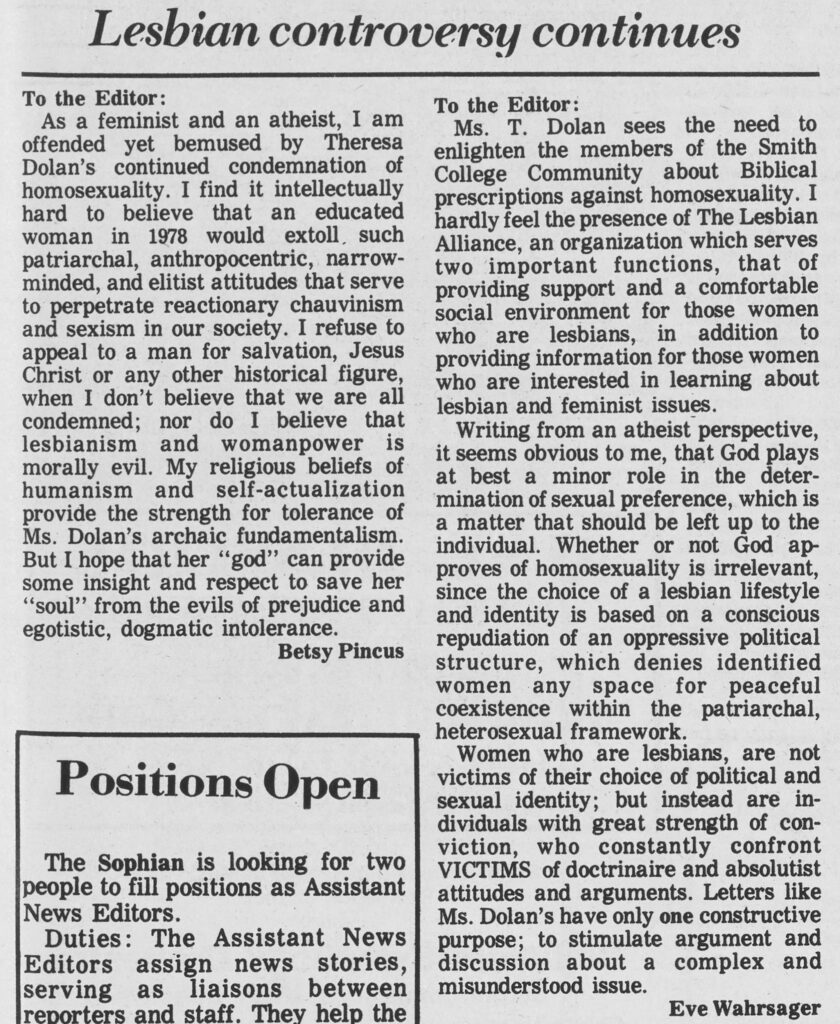
Sophian, Volume 26, Number 17, Page 5, March 9, 1978. Student publications and student publications records, Smith College Archives
Others disputed the validity of looking towards religion at all for moral guidance. These students wrote in the next week, expressing support for lesbianism as a feminist political identity that rejected oppressive patriarchal structures. What do you think about their framing of lesbianism as a political choice rather than an inclination one is born with, as it is more commonly conceived of today? Do you think this framing helps or hinders their argument in the context of this debate?
Hate the sin, but fund the sinner
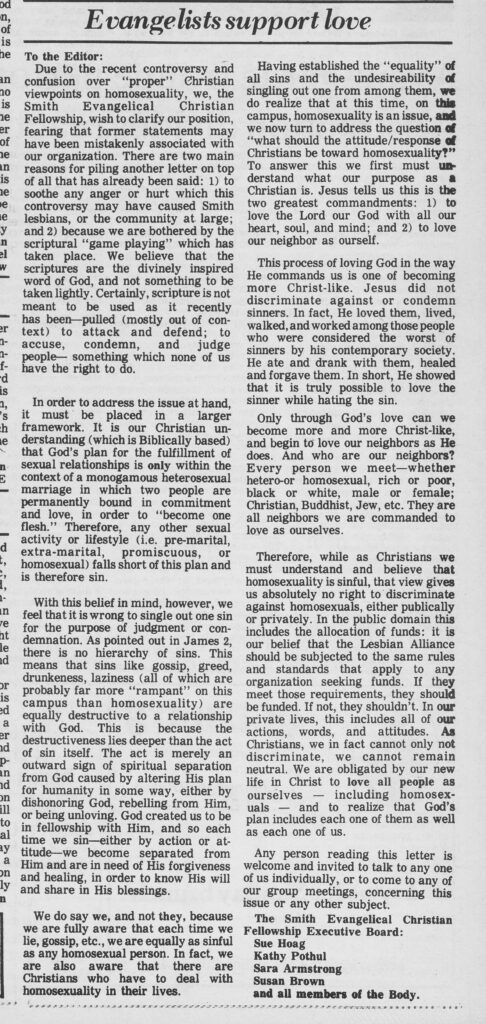
Sophian, Volume 26, Number 18, Page 5, March 6, 1978. Student publications and student publications records, Smith College Archives
One of the most interesting perspectives in this debate came from the Smith Evangelical Christian Fellowship, who offered a more moderate and nuanced position: While they believed homosexuality is sinful, they also did not find it to be a worse than “sins like gossip, greed, drunkenness, or laziness,” also “rampant” on Smith’s campus.
And because Jesus did not hate or discriminate against sinners, the group decided that they should not either. Thus, the Evangelical Christian Fellowship threw in their support for the Lesbian Alliance to be funded like any other student organization.
Does this surprise you? How does their stance challenge (or affirm) your assumptions about evangelical Christians?
Enough is enough
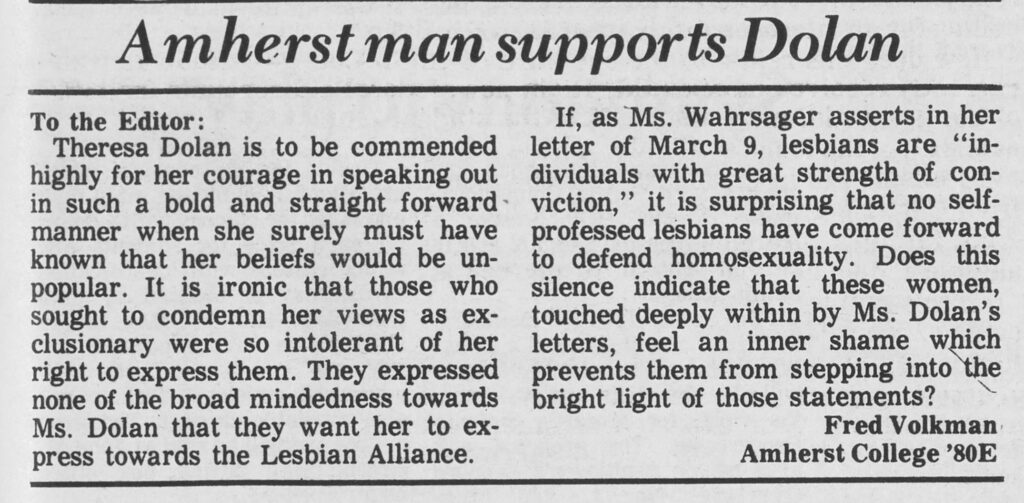
Sophian, Volume 26, Number 18, Page 5, March 6, 1978. Student publications and student publications records, Smith College Archives
The Sophian editors may have realized that the debate had run its course when they received a letter with the ever-asked for opinion of an Amherst man. He suggested that the lack of lesbians outing themselves publicly in the Sophian indicates “an inner shame”—never mind the fact that the entire issue stemmed from the Lesbian Alliance needing funding to host an array of workshops and events that defended and promoted their cause.
On March 16, over a month after the original controversy began, the Sophian printed a notice that they would no longer publish letters on the matter:

Sophian, Volume 26, Number 18, Page 5, March 6, 1978. Student publications and student publications records, Smith College Archives
Think about how polarizing issues are discussed on campus today. What are the benefits and drawbacks of the letter to the editor/op-ed format, where the letters must be signed and editors act as moderators? What do you think is the best platform for debate to occur?
Further reading
All of these viewpoints have their basis in broader historical movements, from the rise of the Christian right to the shifting campus cultures of women’s colleges. It is worth considering these contexts and how they have shaped debates on homosexuality, both in 1978 and today.
- Conway, Jill Ker. A Woman’s Education. Alfred A. Knopf, 2001.
Jill Ker Conway served as the first woman president of Smith College, from 1975 to 1985. During her tenure, Smith underwent huge transformations politically, culturally, and academically. Elite all-male universities were beginning to accept women, and women’s colleges like Smith had to decide how they would remain relevant: go co-educational, or foster a new identity that would attract people to their unique environment. This memoir by Conway details her time at Smith, and she reflects on these issues as well as how gay rights, civil rights, and feminist movements made their mark on the college.
- Fetner, Tina. “Working Anita Bryant: The Impact of Christian Anti-Gay Activism on Lesbian and Gay Movement Claims,” Social Problems 48, no. 3 (August 2001): 411-428.
Investigations of the debates around gay rights in 1978 cannot be had without looking into Anita Bryant and her 1977 “Save the Children” campaign. Her anti-gay activism, based in conservative Christian morality politics, was hugely influential on the rise of the Christian right that found its footing during the Reagan era and continues to this day. As one of the Sophian letters points out, Theresa Dolan appears to have taken her rhetorical cues from Anita Bryant, and so this article provides valuable insight into the larger impact on the LGBTQ+ movement that Bryant had.
- Gasaway, Brantley W. Progressive Evangelicals and the Pursuit of Social Justice. University of North Carolina Press, 2014.
We tend to think of evangelicals as synonymous with the Christian right, always at the forefront of anti-gay rhetoric. But in the 1960s and 70s, there was a small but passionate contingent of evangelicals more aligned with the Democratic party and contemporary social movements. They walked a narrow line between the political left and religious: they promoted racial and economic justice, protested American militarism, and defended feminism and gay civil rights, all while denying women leadership positions in their own churches and denouncing the sin of homosexuality. This branch of evangelicalism seems to be the heritage of the Smith Evangelical Christian Fellowship, and Gasaway’s book sheds light on this seldom-considered sphere of opinion.
- Lesbianism file, 1977-1983, Box 2, Helen Hills-Hills Chapel Collection, CA-MS-01111, Smith College Archives, Smith College Special Collections, Northampton MA.
This file contains most of the clippings of this entire Sophian drama, as well as resources for developing a gay-affirming congregation. It also contains a draft of a letter signed by college religious life staff and faculty supporting the funding of the Lesbian Alliance which later appeared in the Sophian in 1979 when the budget was up for debate again. These records are a fascinating glimpse into the practices and politics of religious life at Smith, and suggest that it was one of the most progressive areas of campus during a time of upheaval.
- White, Heather R. Reforming Sodom: Protestants and the Rise of Gay Rights. University of North Carolina Press, 2015.
This work challenges the idea that the gay rights movements were always diametrically opposed to Christianity, or that the movement can only make strides through the secularization of society. White details the rise of mainline Protestant support for homosexuality in the 1960s, particularly from its clergy, and makes a case for their importance in consolidating the modern gay and lesbian movement. The Christian Council and Helen Hills-Hills Chapel records indicate an alignment with this context, and show that Christian life at Smith was generally in line with the most progressive religious movements.
Works Cited
- Dave Bergman, “The Top 25 Most LGBTQ Friendly Colleges,” College Transitions, February 15, 2023, https://www.collegetransitions.com/blog/great-colleges-for-lgbtq-students/. ↩︎
- Sophian, 1977 – 1978, Student publications and student publication records, CA-MS-01049, Smith College Archives, Smith College Special Collections, Northampton MA. https://findingaids.smith.edu/repositories/4/archival_objects/410999 ↩︎
- Financial material, budget proposals, 1976-2001, Box 3016, Lesbian Bisexual Transgender Alliance records, CA-MS-00112, Smith College Archives, Smith College Special Collections, Northampton MA. https://findingaids.smith.edu/repositories/4/archival_objects/4530 ↩︎
- ECARR FILE 1/ Christian Council, 1977-1978, Box 18, Center for Religious and Spiritual Life records, CA-MS-01057, Smith College Archives, Smith College Special Collections, Northampton MA. https://findingaids.smith.edu/repositories/4/archival_objects/368956 ↩︎
- Lesbianism file, 1977-1983, Box 2, Helen Hills-Hills Chapel Collection, CA-MS-01111, Smith College Archives, Smith College Special Collections, Northampton MA. https://findingaids.smith.edu/repositories/4/archival_objects/390138 ↩︎